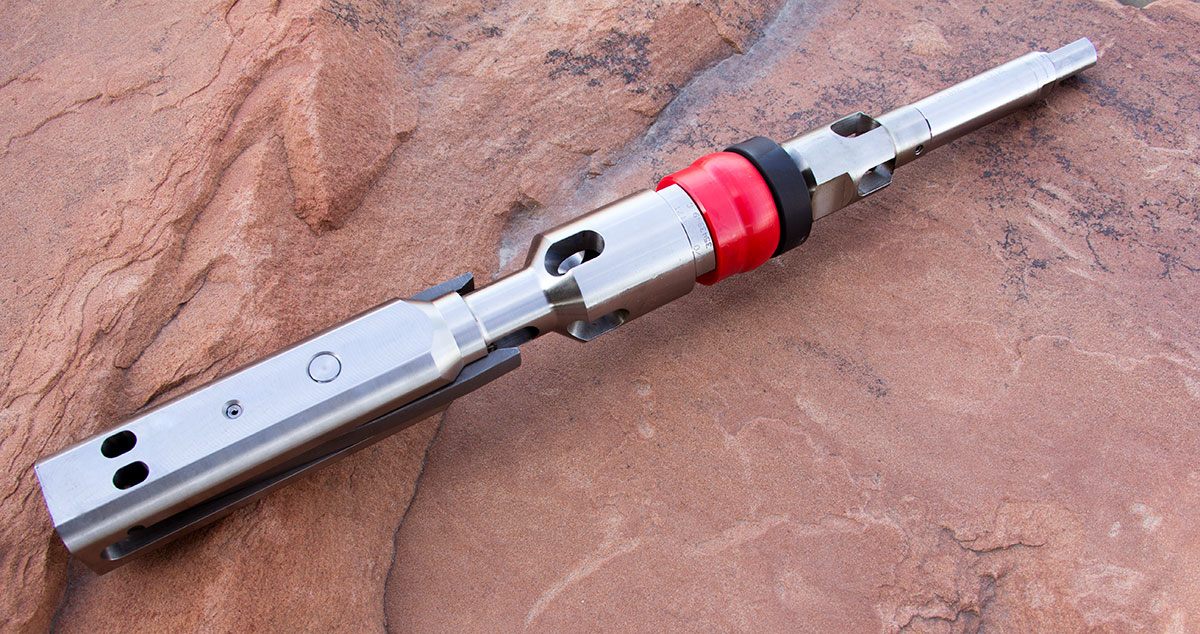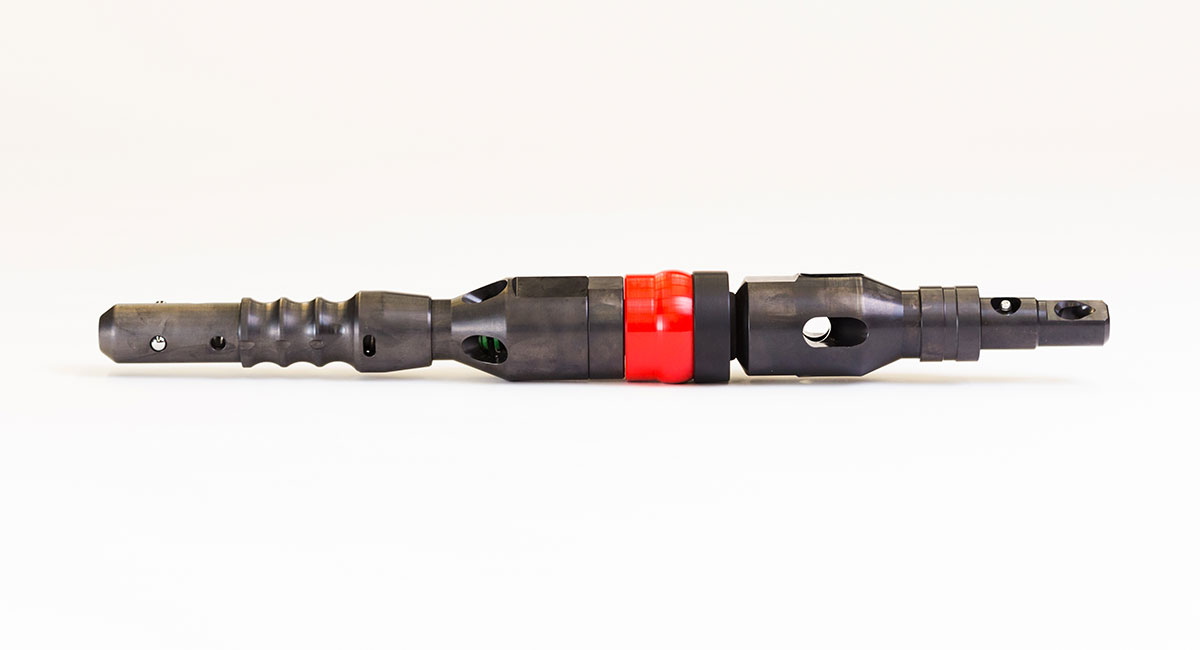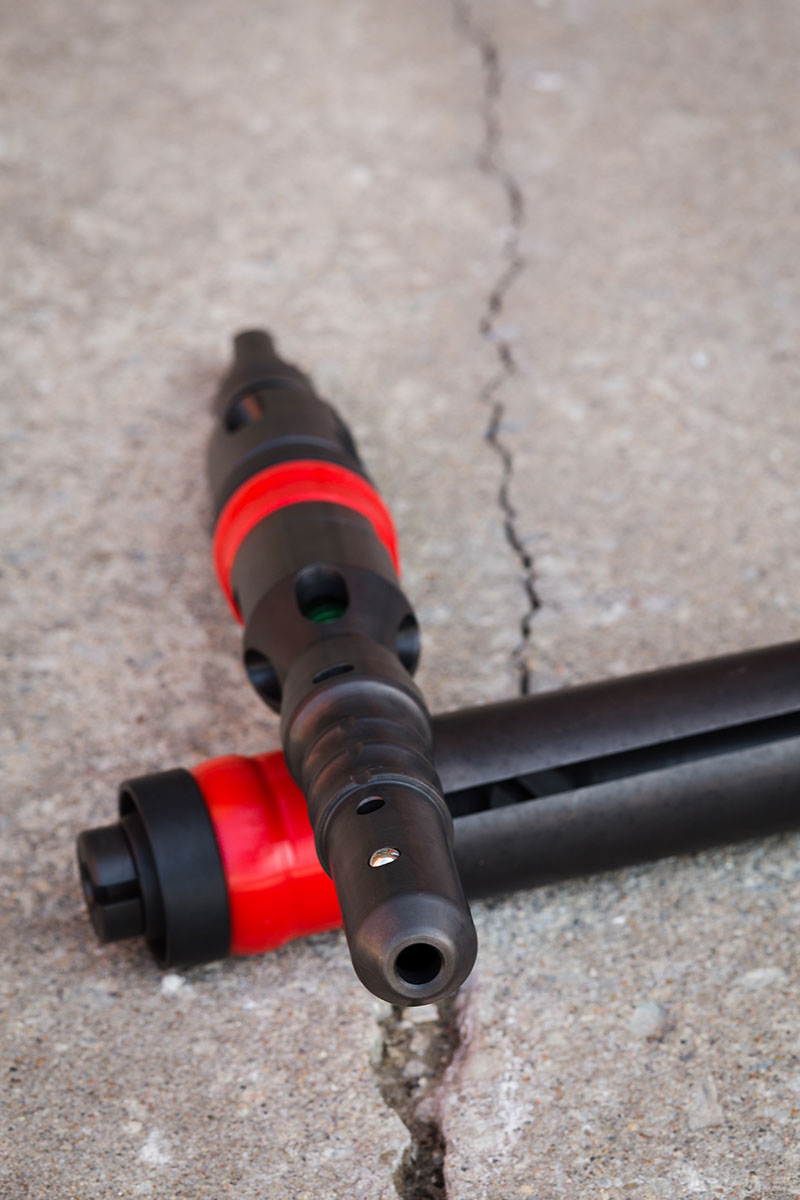EXPLORACIÓN
enero 1, 2022
Perro de elevación cansado? Problema puntual resuelto con nuevo Sobrecalentamiento
El nuevo resumen de Boart Longyear para resolver problemas puntiagudos
Desde que Boart Longyear introdujo el sistema Q ™ Wireline en 1966, la recuperación del tubo interior del cilindro central se ha manejado de la misma manera: un pescante con ganchos de elevación ("dedos" de retención enganchados por resorte) se baja o bombea en el agujero hasta que se encaja sobre un mecanismo pivotante de punta de lanza fijado al conjunto del tubo interno. Una vez que se ha retirado el conjunto de la cabeza del orificio, el perforador utiliza la punta de lanza pivotante para colocar el conjunto de la cabeza en su lugar de trabajo y aprieta la parte posterior de los ganchos de elevación para liberarlo.
En todo este tiempo este sistema (como se muestra en la foto de la derecha) ha tenido los mismos problemas básicos:
Manejo de la punta de lanza: en las aplicaciones de pozo ascendente subterráneas, se requiere un perforador para empujar manualmente el conjunto de la cabeza hacia el agujero por la punta de lanza. Como tiene un extremo puntiagudo y pivota por diseño, puede ser difícil manejar esta operación de manera cómoda.

Manejo del tubo interno: Al elevar el conjunto del tubo interno, la acción elástica del cable o el impacto accidental durante la manipulación pueden descargar la tensión del cable y superar las cargas del resorte, lo que permite que los ganchos de elevación liberen accidentalmente la punta de lanza. El pescante de superficie 'Ezy-Lock ™' incluye un manguito giratorio que se bloquea en la punta de lanza incluso sin tensión del cable, mientras que los pescantes de la competencia requieren tensión del cable para mantener el bloqueo.
Desgaste del gancho de elevación y la punta de lanza: Para equilibrar la solidez y la resistencia al desgaste, los ganchos de elevación y las puntas de lanza reciben tratamiento término a una dureza media. Sin embargo, es difícil evaluar visualmente o probar funcionalmente el grado de desgaste, especialmente en aplicaciones subterráneas.
La seguridad ante todo
Actualmente, Boart Longyear suministra un pasador de seguridad secundario que se engancha a través del pescante y atraviesa justo por debajo de la punta de la punta de lanza. Esto agrega una protección adicional en el caso de que los ganchos de elevación estén excesivamente gastados o deformados. Sin embargo, las puntas de lanza se cargan cíclicamente y a menudo lo hacen "fuera de pivote", lo que deforma los componentes con el transcurso del tiempo hasta el punto de requerir su desmontaje. Si bien la versión más reciente del conjunto de punta de lanza MKII™ es mucho más robusta, en el caso de falla de la punta de lanza, el conjunto del cabezal se soltará del pescante sin importar el uso o condición del gancho de elevación o del pasador de seguridad.
Ingrese: el nuevo Overshot Roller Latch ™ de Boart Longyear

El diseño de este pescante con patente pendiente utiliza nuestra experiencia previa con los conjuntos de cabezales Roller Latch ™ para crear un sistema más confiable y de mayor duración que elimina completamente las puntas de lanza y los ganchos de elevación. El conjunto de punta de lanza se reemplaza por un receptáculo cilíndrico de una sola pieza (adaptador de punta de lanza) donde se ajusta el pescante por medio de rodillos que se enganchan en una ranura interna en el adaptador de la punta de lanza.
Al intercambiar la punta de lanza articulada y puntiaguda por un simple receptáculo cilíndrico, se facilita el manejo de los conjuntos de cabezales en los agujeros ascendentes. Los ensambles de cabezales de los rodamientos de rodillos Quick Descent ™ Surface ni siquiera requieren el adaptador de punta de lanza, ya que la geometría interna del surco fue prevista en su diseño.
El aumento de la resistencia y la dureza de los rodillos de retención tienen un historial probado como trinquetes de larga duración. El nuevo pescante recibirá el mismo tratamiento de superficie NITreg ™ -ONC que los conjuntos de cabezales Roller Latch mejorando así radicalmente la resistencia a la corrosión (Nitreg es una marca registrada de Nitrex Inc.).
La integración del pasador de seguridad en el nuevo obturador subterráneo Quick Pump-In ™ ahora impone una doble función: bloquear el pescante si se suelta accidentalmente durante el izado, y sujetar el conjunto del cabezal y el pescante si falla el componente debido al desgaste excesivo. Además, el receptáculo cilíndrico y los rodillos no se ven afectados por la carga lateral y la carga "fuera del pivote" durante el manejo del tubo fuera del orificio, lo que elimina la deformación gradual o la necesidad de desmontarlo. El nuevo pescante de superficie también incluirá un manguito de torsión para bloquear con una sola mano y mantener la posición mientras se eleva fuera del orificio, incluso con una pérdida de tensión del cable.
También es fácil de usar. En lugar de unir las partes posteriores de los ganchos de elevación, el perforador empuja las dos mitades del conjunto retrayendo los rodillos y soltando el conjunto de la cabeza. Esta operación requiere aproximadamente la misma cantidad de fuerza que el pescante actual, por lo que los perforadores no notarán la diferencia.
Además de la eliminación de la punta de lanza [CA1] y de los ganchos de elevación, se ha incluido otros beneficios adicionales. Si bien el diseño actual usa un pivote sólido que se coloca en su lugar (dificultando la reconstrucción), el Roller Latch Overshot no tiene pasadores. Todo se mantiene en su lugar mediante simples conexiones roscadas para un fácil mantenimiento.
El ensamble Quick Pump-In ™ (Q / P, subterráneo) aborda además dos problemas específicos de las aplicaciones de bombeo
Primero, en el caso de un tubo atascado, el perforador necesita desenganchar y recuperar el cable para poder sacar las barras. Hoy en día, eso se hace al sobrecargar y desconectar un pasador de seguridad colocado justo debajo del cable giratorio. En teoría, este pasador se desconecta a menos de la mitad de la capacidad de carga máxima del cable, pero en la práctica su resistencia es muy variable porque los pasadores de seguridad son inherentemente débiles y dúctiles. Muchos operadores eliminan el pasador de seguridad, lo que también elimina la capacidad de liberación y puede provocar un aumento excesivo de la necesidad de reemplazo del cable.
El Roller Latch Overshot presenta un nuevo sistema de liberación de cable con bomba, originalmente conceptualizado y prototipado por uno de nuestros expertos perforadores subterráneos en Canadá. Se coloca una manga ranurada y un conjunto de sello de bombeo sobre el cable y se bombea hasta el punto superior. La manga se acopla a un mecanismo de liberación rápida y suelta el cable. Este sistema ha demostrado ser mucho más confiable y puede ser la característica más esperada por los perforadores hasta ahora. Se ha recibido informes de menos cables rotos en varios sitios donde se realizan pruebas con el sistema de liberación del cable con bomba.

En segundo lugar, aunque los conjuntos de cabezales Q / P Roller Latch con características de freno incorporadas han tenido un gran éxito al detener los tubos fuera de control y crear un entorno subterráneo de perforación más seguro, quizás sean "demasiado" exitosos. Actualmente, cuando recupera el conjunto del cabezal de un orificio inclinado, se debe aplicar presión para desacoplar el freno. Obtener esta presión y ejecutar el procedimiento perfectamente puede ser difícil, especialmente con la presión hidrostática en profundidad.

Para evitar esto y hacer que el Q / P Roller Latch sea más fácil de usar manteniendo sus características de seguridad, se creó un 'resorte de liberación de freno'. Este resorte se ensambla rápidamente dentro del adaptador de punta de lanza en el conjunto de la cabeza. Mientras se dispara por sí mismo, el freno del conjunto de la cabeza funciona normalmente, pero cuando el pescante se engancha en él, este resorte se comprime, desacoplando el freno. Esta característica también ha sido recibida de manera muy positiva por los perforadores en terreno.
También se está desarrollando un pescante de estilo de superficie en tamaños B / N / H. Además de muchas de las características descritas en este artículo, el objetivo es agregar más innovaciones, incluyendo:
• Un manguito de bloqueo mejorado para desactivar la liberación accidental del conjunto del cabezal y evitar que los perforadores accidentalmente envíen el pescante al orificio mientras está bloqueado.
• Un pivote incorporado de 360 ° y una menor longitud total para una mayor facilidad de manejo.
Las expectativas se mantienen altas mientras las pruebas continúan. Los perforadores están percibiendo los diversos desarrollos positivos: es más fácil de usar, ahorra en consumo de cable y hace que trabajar con conjuntos de cabezales Q / P Roller Latch sea mucho más fácil en condiciones difíciles. Nos mantenemos atentos al éxito obtenido en terreno mientras se comienzan las pruebas para el diseño de superficie.
Para obtener más información y descargas, visite:
Roller Latch ™ Quick Pump-In ™ Overshot - Boart Longyear
Permiso para los medios: Boart Longyear le otorga el permiso inmediato para volver a publicar este artículo. Le solicitamos que cite a Boart Longyear como fuente y proporcione un enlace de regreso donde corresponda.
DISCUSIÓN
-
На этом сайте вы сможете найти разнообразные онлайн-автоматы в казино Champion. Коллекция игр представляет проверенные временем слоты и современные слоты с качественной анимацией и разнообразными функциями. Всякий автомат разработан для максимального удовольствия как на ПК, так и на планшетах. Будь вы новичком или профи, здесь вы обязательно подберёте слот по душе. champion casino Игры запускаются в любое время и не требуют скачивания. Кроме того, сайт предусматривает акции и рекомендации, для улучшения опыта. Начните играть прямо сейчас и оцените преимущества с играми от Champion!



